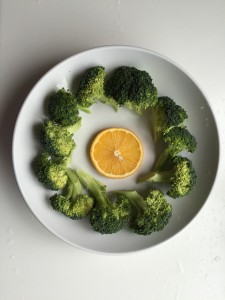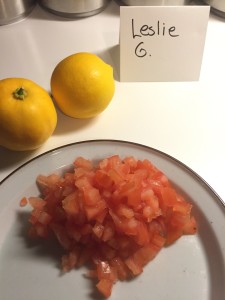I tend to get nervous when I try to “entertain,” i.e. cook for anybody except my partner Michael. I think cooking can be a sign of love and it pains me to think that I might not be expressing my affection for others very well.
In my anxiety I’ve served overcooked food, undercooked food, bland food, burn-your-mouth spicy food. I’ve left out ingredients. I’ve put in the wrong ingredients. (I once mistook raw quinoa for sesame seeds. Whoops!) I have routinely avoided tasting food before I served it, because, well, what if it’s bad? Or what if I try and “doctor” it and make it worse? I’ve mercilessly berated myself for this ineptitude.
I try to relax but with guests arriving and wanting to visit, I have often delayed returning back to the kitchen to check on things, with predictable results.
Until now, my usual cooking “style” has been to dump everything together, stir it up and hope for the best.
One of the things they’ve taught us in this Forks Over Knives online cooking class I’m taking is how you’re supposed to measure everything out and put each ingredient into a separate bowl before you start cooking. They call that mise en place. It’s fun to pronounce: meez zohn plas (with an “a” like plaza).
Yes, the word seems more fun to say than to do. Why should I bother measuring, preparing and putting aside ingredients in little bowls before I start to cook? says my Monkey Mind. If I have the cumin in my hand at that moment, why not just toss it into the big pot and then go look in the fridge for the next thing in the recipe? Why make extra work for myself?
Sure I’ve seen mise en place on cooking shows. I didn’t know it was mise en place. I thought it was just the TV kitchen help lining up all the ingredients in the little bowls on the counter so the superstar chef could demonstrate the real art of cooking.
I don’t have an assistant (s). Why create another job for myself?
Trying to keep an open mind, or rather, trying to pry open an already closed one, I have recently learned mise en place partly has to do with your “state of mind,” so that you can cook in a calm, deliberate, attentive and methodical manner. It’s to keep a would-be chef from forgetting stuff and for putting the wrong stuff in at the wrong time. It’s a way to not discover midway through a recipe that you don’t actually have that one ingredient that you really really need.
At the earthly level, I’m hoping to learn how to not burn the hell out of everything or how to not throw a still-cold-in-the-middle pan of lasagna on the buffet.
On the spiritual plane, I’m working on something else: to love better. I’m wondering if instead on working to love better in order to cook better, I can cook better in order to love better.
Somebody was telling me about a friend of theirs who ate a simple vegan meal at a Buddhist monastery in Japan. They said it was the best meal they’d had in their entire life. I understand that.
Of course, when it comes to cooking and love, it’s not just love for the people who eat the meal but love for what does or doesn’t go into the meal. How can a dish express kindness and attention when it includes the flesh or secretions of an animal who suffered excruciating pain from the minute she was born until the minute she died? How can serving the murdered corpse of an innocent animal (person) who wanted to live a happy, peaceful life be an expression of loving kindness?
In my cooking class, we’ve been invited to consider the shape and the color of plants – the beauty of plants. No I don’t believe those plants suffer when they are harvested, certainly not the way a fish, cow or pig would at slaughter. Instead plants truly are a gift of nature and are to be revered and consumed with gratitude. And I mean consumed!
My favorite quip from cookbook author and activist Colleen Patrick Goudreau: “How do you keep vegetables from going bad? You eat them!”
Peace from one not-so vicious vegan.
– A Vicious Vegan blog post –


